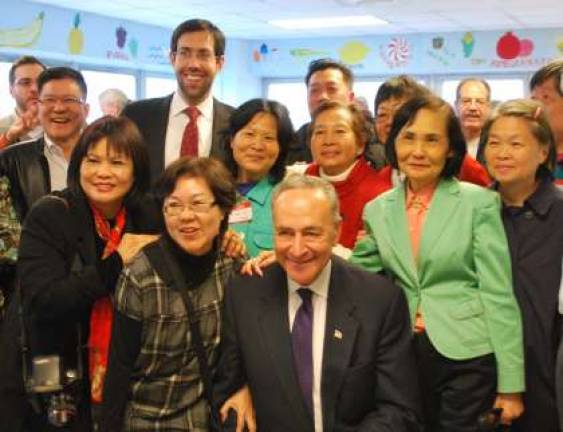Community Turns Out For Squadron

By Courtney M. Holbrook State Sen. Daniel Squadron has a history of listening to his constituents' concerns. Squadron helped secure $66.5 million in funds for the Brooklyn Bridge Park Corporation last week, and has supported bills for marriage equality and ethics reform in the past. These policy decisions came from "listening to the people and working in response to the needs you're raising," Squadron said. Sunday, April 22, Squadron held his fourth annual 25th Senate District Community Convention. Constituents of the 25th District trudged through the rain into the auditorium of the High School of Economics and Finance in Lower Manhattan to share their concerns with Squadron and other members of New York government. "It's at this convention that the plans and concerns of citizens are heard," Squadron said. "We have a lot to do, but listening to you all here, that's a powerful force for making real changes." The general mood of the afternoon focused on praising citizens for speaking out and showing up. "The truth is that the jobs we do are made possible by listening to your concerns," said City Council Speaker Christine Quinn. "And when we organize in a situation like this [convention], when we get the data down-you get listened to and we see results." Quinn noted that specific changes in policy, including the re-evaluation of restaurant grades in Lower Manhattan, had been brought to her attention through citizens' action. Were it not for these meetings, "I wouldn't have known about this in the way I do now," she said. The speeches paid special attention to changes to the transit system. For New Yorkers of all incomes and backgrounds, the MTA has always taken "a more important role at these conventions," Squadron noted. The day's guest speaker, MTA Chairman and CEO Joseph J. Lhota, discussed the past successes and future plans of the MTA transit system, paying attention to the subway and bus lines directly affecting the residents of Lower Manhattan. "When it comes to making government more accessible and being more transparent, the MTA, believe it or not, has done a relatively good job," Lhota said. "But we've done a terrible job of marketing that fact." Lhota discussed transparency projects the MTA has provided for the New York public, including the development of the online MTA STAT on MTA.info, which shows schedules and times for travelers. Lhota also talked about the online dashboard, where transit users can look online at the cost of construction projects conducted by the MTA. "The online dashboard is model of transparency," Lhota said. "We give you the numbers for how much we planned a project would cost, how much we've spent to date and how much we will need to complete a project." Discussion also circulated around new expansions for the L and F lines. Those lines are the "fastest growing lines to date," according to Lhota. According to Lhota, the biggest rider complaint deals with overcrowding. This problem stems from increased growth in the number of paying passengers and the outdated model of the transit system. "The number of [MTA] riders went up to 1.86 billion paying passengers in 2011," Lhota said. "That's the highest number since 1950. But our trains operate under a system that was designed 110 years ago. Our newest operating system is still 70 years old." In order to decrease overcrowding and provide more comfortable systems for passengers, Lhota said the MTA would have to modernize its system. He went into detail on how that would be possible in places like Williamsburg, where subways were not originally designed "for residential areas; we need to put more entrances on all corners of the street to decrease overcrowding." Lhota's speech was met with positive responses from audience members. One attendee, David Feuerman, an entrepreneur who lives in the East Village, was concerned about the efficiency of the transit system, but he welcomed Lhota's remarks. "I was very impressed by him," Feuerman said. "[He] seems to be much more in touch with the broader transportation concerns we all have." The convention continued with Squadron's speech about the importance of public initiative and communication with local government. He also spoke about the American Legislative Exchange Council (ALEC)-a name that brought loud hisses of disapproval from the audience. "ALEC is a conservative organization made up of corporations and special interests," Squadron said. "They brought us the Arizona immigration legislation and the 'Stand Your Ground' law that killed Trayvon Martin." ALEC sees itself as an organization that forces government to make legislation they want, according to Squadron. But Squadron noted that ALEC "does not have a monopoly on making a difference?it doesn't speak for the people. This meeting is what it means to keep the public interest before government, not special corporate interests." After that rallying cry, audience members split into various discussion groups on topics such as rent regulation, marriage equality, transportation, workers' rights and more. According to Squadron, the discussion groups are "where we figure out what you want and work to make it part of our policy." As the audience filtered out, Squadron ended with praise for his constituents, a theme of the afternoon. "There's always a concern when, as a government official, you bring ideas to the table, instead of forcing them on people?when you try to seek solutions instead of fielding complaints," Squadron said. "You wonder whether that will engage people. But today, it clearly has."